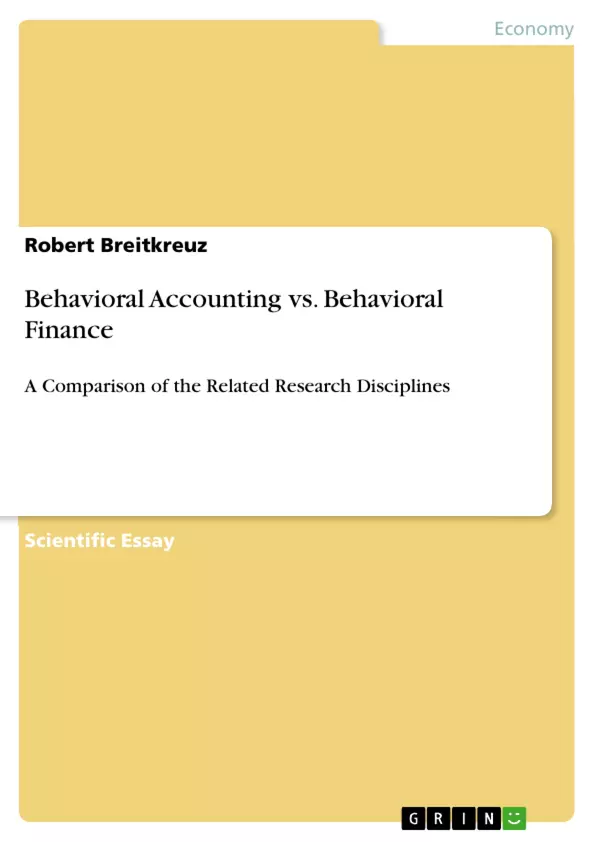An economic theory which is not incorporating human behavior is not imaginable. For reasons of simplification economic models traditionally use the concept of a rational acting market participant. In order to face the inadequateness of this abstraction behavioral economic science reject the assumption of the homo economicus and adds various findings from supporting disciplines as psychology, sociology, and organizational theory. While the exploration of human behavior in finance theory has a long tradition, research in the area of psychological effects in accounting started not earlier than the mid of last century. The main intention of modern financial reporting is the supply of useful information for actual and potential investors within their decision-making process. As information processing of agents
on the market for equity is part of finance theory, this is the meeting point of the two disciplines. The intention of this paper is to identify overlapping contents of behavioral research in finance and accounting. For clarification selected studies from Behavioral Finance Research (BFR) and Behavioral Accounting Research (BAR) literature will be presented and comparatively analyzed. In addition varying fields of research of both schools which are not related with each other were outlined.
Table of Contents
- Introduction and Objectives
- Behavioral Finance Research (BFR)
- Behavioral Accounting Research (BAR)
- Conclusion
Objectives and Key Themes
This paper aims to identify overlapping areas of behavioral research in finance and accounting. It analyzes selected studies from Behavioral Finance Research (BFR) and Behavioral Accounting Research (BAR) literature to highlight similarities and differences. The paper further explores distinct areas of research within both fields. Key themes explored in the paper include:- The concept of the 'homo economicus' and its limitations
- The impact of psychological effects on financial markets
- The influence of behavioral biases on investor decision-making
- The challenges to the Efficient Market Theory (EMT) posed by behavioral research
- The application of behavioral insights to various financial areas such as asset allocation, portfolio construction, and corporate finance.
Chapter Summaries
Introduction and Objectives
This section introduces the concept of behavioral economics and its application in both finance and accounting. The paper highlights the limitations of traditional economic models that assume rational market participants. It emphasizes the importance of understanding human behavior in financial decision-making and explains the role of behavioral research in both finance and accounting.Behavioral Finance Research (BFR)
This chapter explores the foundations of Behavioral Finance Research (BFR), which challenges the traditional assumptions of the homo economicus. It examines the historical development of BFR, tracing the emergence of concepts like the 'random walk' and the Efficient Market Theory (EMT). The chapter also discusses the work of Kahneman and Tversky, whose Prospect Theory revolutionized the understanding of investor behavior and risk perception.Behavioral Accounting Research (BAR)
This chapter focuses on the application of behavioral insights to accounting research. It examines the various ways in which psychological biases influence accounting practices, financial reporting, and investor decisions. The chapter discusses examples of empirical studies that demonstrate the impact of cognitive biases on investor behavior and how these biases can lead to market inefficiencies.Conclusion
This section summarizes the key findings of the paper and discusses the implications of behavioral research for both finance and accounting. It highlights the importance of incorporating behavioral considerations into financial models and decision-making processes. The conclusion emphasizes the need for further research in this field and explores potential areas for future exploration.Keywords
The main keywords and focus topics of the paper include: behavioral finance, behavioral accounting, homo economicus, psychological biases, Efficient Market Theory, Prospect Theory, investor behavior, information processing, market anomalies, financial reporting, accounting practices, asset allocation, portfolio construction, risk management, corporate finance.Frequently Asked Questions
What is the difference between Behavioral Finance and Behavioral Accounting?
Behavioral Finance focuses on human behavior in financial markets, while Behavioral Accounting explores psychological effects on accounting practices and financial reporting.
Why is the 'homo economicus' model criticized?
Behavioral economics rejects the assumption of a purely rational market participant, adding findings from psychology and sociology to better reflect real-world decision-making.
What is Prospect Theory?
Developed by Kahneman and Tversky, it explains how people choose between probabilistic alternatives involving risk, showing that they perceive gains and losses differently.
How do cognitive biases affect financial markets?
Biases can lead to market anomalies and inefficiencies, challenging the traditional Efficient Market Theory (EMT).
What are the main research areas of Behavioral Accounting (BAR)?
BAR examines how psychological biases influence individual judgment in auditing, financial reporting, and managerial accounting decisions.
Where do Finance and Accounting meet in behavioral research?
They overlap in the study of information processing by market agents and how this information influences investment decisions.
- Citar trabajo
- Robert Breitkreuz (Autor), 2008, Behavioral Accounting vs. Behavioral Finance, Múnich, GRIN Verlag, https://www.grin.com/document/129284



